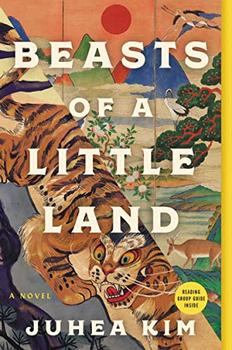Summary | Excerpt | Reviews | Beyond the Book | Read-Alikes | Genres & Themes | Author Bio

A Novel
by Juhea KimThis article relates to Beasts of a Little Land
.jpg) Juhea Kim's Beasts of a Little Land covers half a century of Korean history, including the Japanese occupation of Korea. The occupation began in 1910, when Japan annexed the Korean peninsula. This occurred after years of attempts by the Japanese government to exert rule over Korea, due in part to its economic interest in the country's geographic positioning and resources.
Juhea Kim's Beasts of a Little Land covers half a century of Korean history, including the Japanese occupation of Korea. The occupation began in 1910, when Japan annexed the Korean peninsula. This occurred after years of attempts by the Japanese government to exert rule over Korea, due in part to its economic interest in the country's geographic positioning and resources.
During colonial rule, the Korean language was forbidden in schools, and Korean historical documents were destroyed. Koreans were expected to assimilate to Japanese culture, to the extent of taking on Japanese names and engaging in Shinto worship, a practice aligned with traditional Japanese religious and ideological beliefs. Japanese occupiers exploited Koreans for manual labor and forced tens of thousands of Korean women, known as "comfort women," into sexual slavery in brutal conditions that many did not survive.
Colonialism also involved the widespread destruction and redistribution of Korean land and resources. Japanese families that moved onto Korean land during the occupation cut down millions of trees. Native species of plants were replaced with non-native ones, altering the landscape and agriculture in the area permanently. For example, before Japanese colonialism, over 1,400 unique varieties of rice indigenous to Korea could be found on the peninsula, but they were nearly all wiped out during the occupation.
Many Koreans rebelled against Japanese rule. A famous example of this is the March 1st Movement, also known as the Samil Independence Movement. On March 1, 1919, demonstrations for Korean independence began in the city of Seoul, sparking an ongoing nationwide series of protests over the next year, during which the Japanese military and police killed thousands of Koreans and arrested tens of thousands. Though the movement did not end the occupation, it did strengthen Korean unity and its inception is celebrated today as a national holiday.
The occupation finally concluded in 1945 when Japan surrendered to Allied forces at the end of World War II, though the country was subsequently occupied by U.S. and Soviet forces, leading to the Korean War.
While Japanese rule of Korea has been over for more than 75 years, its effects are still felt both personally and politically. In 2018, during the Olympic Winter Games in Pyeongchang, South Korea, an NBC commentator suggested that Korea should be grateful to Japan for its influence, saying that "every Korean will tell you that Japan is a cultural, technological and economic example that has been so important to their own transformation." This sparked outrage among Koreans and resulted in a petition demanding an apology. The petition stated, "Any reasonable person familiar with the history of Japanese imperialism, and the atrocities it committed before and during WWII, would find such a statement deeply hurtful and outrageous."
In addition to Kim, many writers of Korean descent have depicted the Japanese occupation in fiction or nonfiction. Min Jin Lee's multi-generational epic Pachinko may be the best-known example of English-language historical fiction that covers the Japanese occupation of Korea. Alexander Chee, author of Edinburgh and Queen of the Night, wrote an essay for the New York Times about how his grandfather's experiences with poverty and oppression under Japanese rule affected the way he related to his family for years to come: "...the more openly didactic qualities of my visits with my grandfather — always being told that Korean culture or language was superior, for example [...] — I now understand as the act of a man who still woke from dreams in Japanese, who had lived to see a future where his son, also born during the occupation, could decide not to live in the country once lost to them, could decide not to teach what was once forbidden for them to learn."
March 1st Movement demonstration, 1919
Filed under People, Eras & Events
![]() This "beyond the book article" relates to Beasts of a Little Land. It originally ran in January 2022 and has been updated for the
December 2022 paperback edition.
Go to magazine.
This "beyond the book article" relates to Beasts of a Little Land. It originally ran in January 2022 and has been updated for the
December 2022 paperback edition.
Go to magazine.
Your guide toexceptional books
BookBrowse seeks out and recommends the best in contemporary fiction and nonfiction—books that not only engage and entertain but also deepen our understanding of ourselves and the world around us.